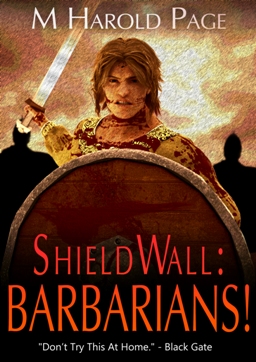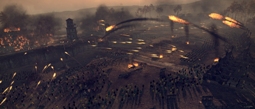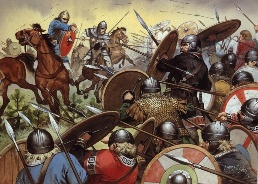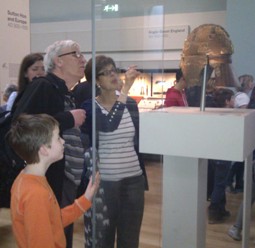What Really Happened at the First Siege of Orleans? And, Where Does Dark Age History Come From?

When I was writing Shieldwall: Barbarians! I borrowed a trick from Bernard Cornwell and plunge my hero into the thick of all the epic battles. That’s how Prince Hengest and his Jutes ended up at the Siege of Orleans.
No, not the Battle of New Orleans. And not the one with the Maid in it either.
This one was much much earlier – AD451 – when Orleans was Aurelianum. There was however a hero in a dress, if that’s an appropriate way of referring to a bishop’s vestments.
Here’s what happened:
King Attila with perhaps 100,000 Huns, Lombards, Gepids, Ostrogoths, renegade Romans and other riffraff pushed through the patchwork remnants of Roman Gaul, knocking over cities for supplies, until he reached Orleans.
Then he went away again.
Oh, was that anticlimactic?
You want to know the detail of what happened?
Hah! Sorry, the Dark Ages should really be called the “Historiographically Challenged Period”, meaning the ages are “dark” because we have difficulty seeing what was going on.
We have two main accounts from the time — chronicles.

First, we have the most famous, A History of the Franks by (Saint) Gregory of Tours who lived a century or so later. Gregory is not just a (future) saint, he’s a churchman. So though he’s telling the story of the truly appalling Merovingian Franks — e.g. the reason King Clovis didn’t have much in the way of relatives was because he murdered them all — who ruled France at the time, he’s most interested in making the Church look good.
In his version of the story, the hero is the ancient Bishop Annianus:
And Attila king of the Huns went forth from Metz and when he had crushed many cities of the Gauls he attacked Orleans and strove to take it by the mighty hammering of battering rams. Now at that time the most blessed Annianus was bishop in the city just mentioned, a man of unequalled wisdom and praiseworthy holiness, whose miracles are faithfully remembered among us.
According to Gregory, his main contribution was praying loudly for aid from Count Aetius, who’s best thought of as a rogue Belisarius played by Russel Crowe. Finally, after a lot of brave looking to the horizon:
Meanwhile, when the walls were now trembling from the hammering of the rams and were just about to fall, behold, Ætius came, and Theodore, king of the Goths and Thorismodus his son hastened to the city with their armies, and drove the enemy forth and defeated him. And so the city was freed by the intercession of the blessed bishop.

The battle he skims over is the apocalyptic Ragnarok-class battle of Chalons, basically Waterloo with more body armour and no gunpowder. It happened because Aetius managed to persuade the German tribes, who he’d spent years fighting, that the Huns, his former allies, were now such a threat that they should make common cause.
So, yes, in Gregory’s “church world” diplomatic genius, logistic achievement and tactical nous, not to mention hard fighting are as nothing compared to the prayers of an old man in a dress. Talk about spin doctoring!
Second, we also have The Gothic History of Jordanes. Jordanes was also writing a century later, but he’s pro-Goth. Moreover, though he was a Roman bureaucrat, his faction had been on the Hunnish side:
Well then, Sangiban, king of the Alani, smitten with fear of what might come to pass, had promised to surrender to Attila, and to give into his keeping Aureliani, a city of Gaul wherein he then dwelt. When Theodorid and Aëtius learned of this, they cast up great earthworks around that city before Attila’s arrival and kept watch over the suspected Sangiban, placing him with his tribe in the midst of their auxiliaries. Then Attila, king of the Huns, was taken aback by this event and lost confidence in his own troops, so that he feared to begin the conflict. (from the Gutenberg version)
Atilla falls back and after some dire oracles, fights the Battle of Chalons. Jordanes treats us to an epic description of the said battle which puts the focus on the Goths.
So — argh! –we have two sources, writers who weren’t there but had access to traditions, both writing with great certainty and detail, and contradicting each other.

Gregory doesn’t mention Orleans belonged to the Alans. Nor does he mention earthworks. He does however have the Hunnish battering rams gnawing at the walls like something out of… well Total War: Attila. Jordanes skips the siege entirely. Attila arrives to find the Roman alliance already there and dug in! The only thing they agree on is that the Aetius and friends chased off Attila, then fought him elsewhere. Clearly, one or both historians is Making Things Up or Leaving Things Out.
So, putting on my dusty academic historian hat, I can’t swear that a siege actually took place.
Fortunately, as a historical novelist, I get to join the dots and decide that both versions are mostly true. The battering rams are at work long before Aetius turns up, and of course, Prince Hengest is there defending the walls…
THUD!
–and a huge section detached itself from the city wall, teetered, and fell inwards like a drawbridge.
There was a deafening crash, then whoops and cheers from the attackers.
“Tyr’s Teeth!” said Hengest.
The sun now shone through a massive gap in the city wall, broken only by the dark triangle of the battering ram.
A roar swelled up like the sea rushing into a bay. Then came the rumble of thousands and thousands of boots.
I don’t know about you, but I like my version best. My son, my first but by no means last test reader, agrees. This book is all his fault, but that’s another story…
M Harold Page (www.mharoldpage.com) is a history graduate and swordsman. His gritty, action-packed YA Dark Age adventure, Shieldwall: Barbarians! is now available on Amazon. And, if you live near Edinburgh, Scotland, he would love to teach you Medieval German Longsword.
Now, if Annianus had prayed some answered prayers for, say, tornadoes or armor-infiltrating wasps or earthquakes, some form of straight-up smiting, that would have been impressive, age and fashion choices notwithstanding. Praying to have your tush saved by somebody else who was already inclined to do the saving? You’re right, not so much.
I think my favorite thing about that cover is the wording of the Black Gate endorsement. Makes standing against Attila the Hun sound like something Bam Margera might do on MTV.
@sarah
The reason you like the Blackgate endorsement is that they are YOUR words – your review of my Marshal book. http://www.blackgate.com/2014/02/06/the-series-series-marshal-versus-the-assassins-by-m-harold-page/
“There are so many reasons this stand-alone adventure in the Foreworld Saga could be subtitled Don’t Try This at Home.”
BTW check your email!
I’d forgotten those words, though I remembered the effect of the book that I tried to express in the review. And yes, I would be delighted to review your new one. I haven’t been posting here as regularly as I’d like to — the last thing to come back to me after a concussion in November is my reading speed, which still isn’t quite what it was. The things I think I’ll get done still get done, just later than I expect.
Concussion! OMG you DID try it at home.